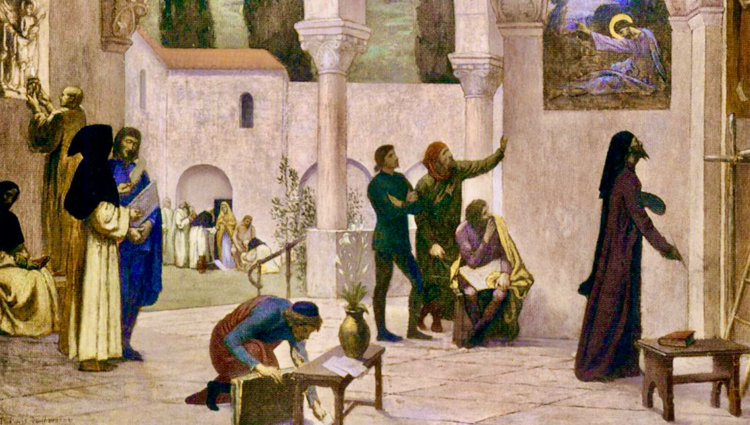 America’s Christian culture began to erode at the turn of the 20th century, with the rise of bureaucratic public schools. The belated Christian reactions to this were homeschooling, parent-led Christian schools, co-ops and pods, and now classical charter schools. Yet, when set alongside their agnostic fellow citizens, Next-gen Christians have proven equally susceptible to loneliness, anxiety, family breakup and divorce, voluntary infertility and tiny families, warehousing seniors and “Bowling Alone” levels of civic non-engagement. Supposedly safe, Christian secondary education hasn’t been enough.
America’s Christian culture began to erode at the turn of the 20th century, with the rise of bureaucratic public schools. The belated Christian reactions to this were homeschooling, parent-led Christian schools, co-ops and pods, and now classical charter schools. Yet, when set alongside their agnostic fellow citizens, Next-gen Christians have proven equally susceptible to loneliness, anxiety, family breakup and divorce, voluntary infertility and tiny families, warehousing seniors and “Bowling Alone” levels of civic non-engagement. Supposedly safe, Christian secondary education hasn’t been enough.
Why? Because Christian formation isn’t finished at age 18, says Nicholas Ellis, the community developer at Christian Halls International. Having carefully shepherded their kids through high school, Christian parents then ship them off to distant universities and colleges, where they’re educated, at best, by Christian scholars, detached from any local community, or at worst, by atheistic socialists. The undergrads may cling loosely to their faith, meet a marriage partner from a yet more distant town, and then try to raise a family, far from any grandparental help. (And given how hard that is, they will likely have fewer kids.) Or their atheist professors may seduce them into lives of nihilistic despair and shallow skepticism. Meanwhile, back home, their local communities and governments are abandoned to the faithless, avaricious and radical.
Private Christian schools can be the worst for encouraging this rootless education, says Ellis, an Oxford PhD, because they think they succeed only when they ship their grads off to distant, prestigious, and expensive universities or colleges, as if training a professional nomad is more worthy than nurturing a faithful, cultured, and engaged community member. Then they complain about a collapsing society? Christian society is first and foremost a family of charity, love, and trust. This happens only if those bonds are nurtured between generations—mentors and elders, grandparents and parents—more than with some random varsity peer group. Christian kids need to be shepherded, not into all-consuming careers, but into faithful, productive communities.
So the problem is: How can Christian young adults receive a superior academic, professional, or technical education, nurturing their organic human formation and community engagement, and do it affordably at home, whether in Jackson, Springhill, or Meridian?
Enter Christian Halls International. Since its 2020 founding in Midland, TX, Christian Halls has been facilitating post-secondary, degree-earning “Halls” that are local, intergenerational, and self-governing. The growth has been exponential: five Halls in 2021, 12 in 2022, 50 in 2023, and 177 in 2024. The target for 2025 is predictably 521-plus, with local Halls educating anywhere from five to 500 students each. So far, CHI is affiliated with twenty accredited universities or colleges, offering 500 different degrees or certificates for any feasible career. This is not pie-in-the-sky. It is a practical, grass-roots rebuilding of Christian society and culture, cutting the corrupt and bloated mainstream universities out of the loop, to die with their endowments.
What goes into a local Christian Hall? CH International has a sophisticated, secure internet platform that serves as a clearing house for on-line courses and degree programs, either offered already at its affiliated universities and colleges, or developed by their local Christian mentors and accredited by the institutions. On-line learning is notoriously lonely, mechanical, and feeble in human formation, so as its primary intent, the local Hall provides structured seminars, tutored by local “elders”—homeschool veterans, pastors, retired Christian academics, tradesmen, and businessmen. And in the next year, Ellis hopes to work up Christian musicians, actors, and artists into conservatory Halls. Each student’s program is tailored to the particular needs and tutors, with CHI running interference between the local Hall and the accrediting university.
“We’ve disaggregated the curriculum from the accreditation, the local Hall from the university, so we’re in charge of our programs,” says Ellis. “This is self-government.” Yet, when he’s asked if he’s primarily a “program broker,” Ellis objects: “No, I’m really a community designer. Part of that is brokering programs, but I’m here to help build the local Christian learning community.”
This is where the “local” and “intergenerational” come in: tapping unused resources. “Christian teachers and professionals—Christian grandparents—have no right to retire to the golf course,” Ellis insists. “They’ve got a wealth of experience and wisdom, desperately needed by the next generation.” They should have no false-modesty about their abilities, given the blatant ignorance and corruption in the mainstream universities. The instructional method is the “Oxford tutorial” or seminar, reading and face-to-face discussion, a recipe for the tutor’s own lifelong learning.
So, what does “community building” look like? Wherever Ellis lands his old hand-me-down Cessna, his prospective clients are well-established homeschool co-ops, local churches, private schools, and Christian businessmen—and best of all, a combination of them all. The co-ops are energetic, right off the blocks, while churches and private schools already have the facilities. Co-ops have a cohort of experienced homeschoolers, stepping up as tutors, but their time is limited. Churches and schools have credentials and time, but they must be shaken loose from their naïve complacency about mainstream education. In contrast, Christian businessman are fully aware of the decadence of the established schools and colleges, and desperate for virtuous employees, so they offer paid internships, kids working debt-free toward a degree or professional certificate.
Best of all, freed from the false narrative that they must wander to mature, the young adults can grow up in their home towns, fully engaged with their public-spirited elders, primed to start their own families, and ready to inherit the local government. So, whatever the students’ professional programs, political science options in state and local government, political campaigns, and public policy are promising possibilities.
It is a win-win, all around: the students get credit hours at a highly competitive rate; the tutors develop often forgotten aptitudes, and families keep their young adults in the local community, awaiting grandchildren. Meanwhile, CH International is building on its platform a library of content-rich, Christian-friendly courses. And it’s painless for an accrediting university.
Christian Halls’ programs cost a bargain $100/credit hour for dual-credit courses, up to age 19, then $250/hour for straight post-secondary credits, totaling less than four grand per semester. Tuition is split 50 percent for the accrediting university, 25 percent for CH International, for their growth and platform upkeep, and 25 percent back to the local Halls, for remunerating tutors and their (usually existing) facilities. The sweet deal for the universities ensures their cooperation.
Ellis comes naturally by his entrepreneurial evangelizing. Born in Lincoln NB in 1982, one of five, he was raised and homeschooled in Dallas. His father, a “non-denominational Southern Baptist,” was called to mission in northern Brazil in 1994, but when the family arrived there, his classically educated mother Diane discovered, first, that homeschooling was unknown in Brazil, and second, the public schools were dominated by socialists. So the family kick-started the Brazilian homeschooling movement through their family-run EDiBrazil. They began with a cadre of 300 volunteer translators, expanded the business into a thousand employees, struck deals with Zondervan for Portuguese-language versions of their entire homeschool library, and founded biblemesh.com online curriculum—including courses in New Testament Greek. EDiBrazil is now a subsidiary of English-language umbrella EDiGlobal, based in Texas.
Nicholas Ellis’s own academic career began in 2002, in Biblical Studies at Union University, continued at Trinity Western’s Dead Sea Scrolls Institute, and finally Oxford. His 2009 arrival in Oxford provided the initial inspiration for his Christian Halls. Like many Americans, he and his wife wandered into the Gothic town, looking for the University, but found instead three-dozen scattered, self-governing colleges. He found that their curricula were almost entirely reading and discussing in small seminars—mentoring. So, as he completed his PhD in 2014, he resolved to establish such independent colleges in Brazil. Then in 2019, some Christian Texans asked him to bring the Halls to America, and he moved with his wife and soon-five children to Arlington TX, to incorporate Christian Halls International. And the rest, as they say, will be history.
Christian Halls International is committed to the organic revival of a Christian society at the grass roots. Ellis calls himself “a Nicene Christian,” invoking the ancient Trinitarian Creed, so he is gearing up a Christian Halls stream for Catholics. Given the distinct cultures of liturgical churches (including traditional Lutherans, Anglicans, and Orthodox), in conversation with savvy, conservative bishops, he is developing a separate stream for Catholic courses and university affiliations: the Campion Halls (named for a priest martyred in the Elizabethan persecution).
What’s more, true to the “International” in its name, Ellis is already working on expansion into Canada. Canada’s homeschooling population is proportionally half of the United States’ ten percent, but education is likewise a provincial jurisdiction, and some provinces are homeschool and private school friendly. With the exception of the very few, isolated Christian universities, Canada’s post-secondary education is entirely public and “woke,” like the American Ivy League. Christian Halls should find a warm, even desperate welcome there, so Ellis is traveling north of the border in this coming year.
It may seem paradoxical: Christian Halls is an international association to renew local communities. Yet Progressive activists have long perfected the technique of “moving up” levels of government, to enforce whatever regulations they crave—from town to county, and county to state, nation and “world community.” Christian society, however, is committed to the principle of subsidiarity or sphere-sovereignty, pushing authority down to the most immediate level, fundamentally the family and the local community. So Christian Halls is essentially a seeder for local seeds, flowering organically: “first the blade, then the ear, then the full corn in the ear.”
Ellis recognizes the challenge in overturning the deeply engrained, modern disdain for the local. Everyone breathes the elitist assumption that real proficiency must be sought “anywhere but here.” But this takes far, far too lightly the corruption of the modern educational establishment. For sane, faithful Christians, the mainstream schools are simply no longer an option.
What’s more, the economic challenges facing the next generation will favor the Halls. America is facing a real demographic slump, most severely among Progressive families, cities, and states. While the Christian fraction will grow proportionately, the collapse of globalism and the looming economic doldrums will favor domestic necessities like local, productive employment, over luxuries, like distant, expensive academic degrees.
Any prejudice against the local disparages mentoring virtuous characters in a living community, for the sake of training in narrow skills for the bureaucratic establishment—the Tower of Babel. All mankind’s great cultures, from the Hellenic Golden Age, to the Gothic Renaissance, Dante’s Florence, Shakespeare’s London, and the Dutch Golden Age, were deeply rooted their local communities, face-to-face friendships, and a shared faith. America’s high culture may yet be awaited, but when it comes, it will be Christian and domestic.
View Christian Halls’ YouTube channel here.
The Imaginative Conservative applies the principle of appreciation to the discussion of culture and politics as we approach dialogue with magnanimity rather than with mere civility. Will you help us remain a refreshing oasis in the increasingly contentious arena of modern discourse? Please consider donating now.
The featured image is “Inspiration Chretienne” [“Christian Inspiration”] (between 1887 and 1888) by Pierre Puvis de Chavannes, and is in the public domain, courtesy of Wikimedia Commons.











